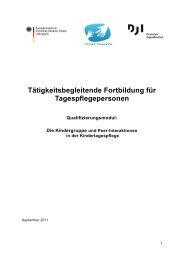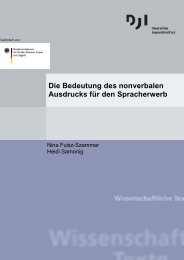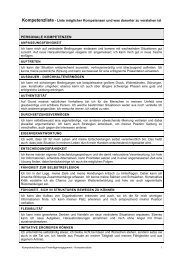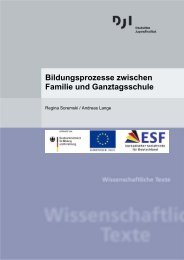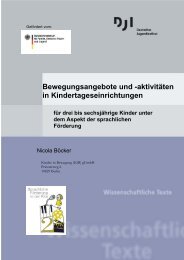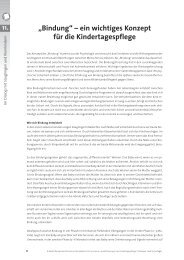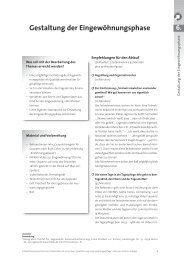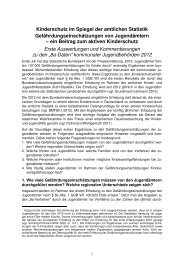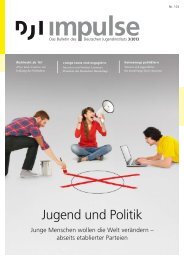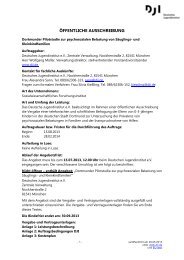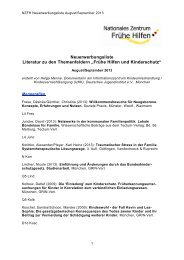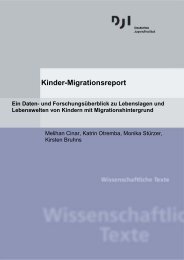download - Deutsches Jugendinstitut e.V.
download - Deutsches Jugendinstitut e.V.
download - Deutsches Jugendinstitut e.V.
You also want an ePaper? Increase the reach of your titles
YUMPU automatically turns print PDFs into web optimized ePapers that Google loves.
While previous Roma integration programme has focused on the segregated case of<br />
Kirtimai, the new programme (2007-2010), that is currently awaiting confirmation by the<br />
Government, has foreseen the expansion of measures for Roma in other regions. However,<br />
the challenge remains to strike a balance between the competencies and obligations<br />
between the Government and municipalities.<br />
Areas of social life such as employment also remain of high importance for the Roma.<br />
Currently the NGO Lithuanian children Fund implements a largest so far Roma-focused<br />
project of its kind Creation and testing of the support mechanism for the integration of<br />
Roma into labour market funded by the EU initiative EQUAL. National strategy of antidiscrimination<br />
2006-2008 is also important for strengthening an overall framework for<br />
equal opportunities, however, Roma are not singled out . There is further need to develop<br />
active and direct labour market measures for the extremely socially disadvantaged groups<br />
such as Roma.<br />
Activities at community level: Roma Community Centre and its role<br />
Since it is difficult to include the matters of a relatively small Roma community into the<br />
agenda of national institutions and into the mainstream policy schemes, the institution that<br />
is both visible, easily available and responsive to Roma individuals proved to be a success.<br />
The Roma Community Centre (RCC) in Kirtimai has its own premises and operates since<br />
2001. The founders of the Centre are the Department of National Minorities, Municipality<br />
of Vilnius City, NGO Lithuanian Children’s Fund, and Roma NGO Romany Jagory. The<br />
RCC has five employees, including teachers, social workers, and also employs more stuff<br />
via project activities.<br />
The RCC has implemented many innovative activities, many of which were in the are of<br />
pre-school education for Roma children. While there had been doubts expressed by the<br />
various sources whether separate classes would not lead to higher segregation, the practical<br />
evidence suggest the opposite: the preparatory classes were amongst the most effective<br />
good practices. Teachers report that children who entered schools after these classes were<br />
better prepared both to follow the courses and catch up with their peers.<br />
The RCC has by now became an active player itself, who searches for larger projects,<br />
funding possibilities, and partnerships. While it still lacks the weight to provide substantial<br />
influence for the policy agenda, it does have Roma trust, experience, and direct knowledge<br />
about what policy measures work and which do not.<br />
See more:<br />
Roma: Situation Overview (2005) Research report, Vilnius: Human Rights Monitoring Institute,<br />
April 2005. Available at:<br />
http://www.hrmi.lt/<strong>download</strong>s/structure//Romu_padeties_analize_20050412%20ENG121.pdf<br />
Centre of Ethnic Studies of the Institute for Social Research (2004) Roma in Public Education.<br />
Study prepared at the request of the European Monitoring Centre on Racism and Xenophobia,<br />
October 2004. Vilnius.<br />
Available at: http://www.ces.lt/<strong>download</strong>s/structure/files/Roma_Lithuania.pdf<br />
45



